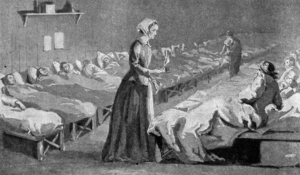The surgeon to François Ier of France, Ambroise Paré, gave this classic statement of the doctor’s mission:
Guérir parfois, soulager souvent, consoler toujours.
In his day, there were few hospitals. Most people were born, went to their beds when they fell sick, recovered a few times, and finally died, all in their own homes. It wasn’t much different in 50,000 BC. Hospitals were for the few mobile categories: soldiers, seamen, merchants, pilgrims. Paré would have done most of his surgery in tents in the rear of the battlefield.

The hospital, as a temple of scientific medicine, is a 19th-century invention. The Dr. House TV series offers an exaggerated but basically fair image of its ethos. The model is badly adapted to a massive epidemic of nearly identical cases. In parts of Lombardy, hospitals have been overwhelmed, and resorted to triage. The older arrivals with preexisting conditions have reportedly sometimes been left in corridors to die with minimal palliative care. Ethically, this is not really problematic; in human terms, it is horrific. The same is very likely to happen in many other countries, including the UK and the USA (here, report 9).
I am 73 with asthma. I therefore have a personal stake in this problem, which has started to arise in Madrid. The army are setting up large improvised field hospitals. This fixes the bed shortage, and I trust that crash programmes are under way to make respirators and masks, but you can’t create qualified nurses in a few weeks.
So you enlist unqualified ones. Go back to the 18th century, and ask family members to care for the sick at home. Patients who fail the hospital triage would be sent home with a Happy Care package, including an army or airline-issue respirator, a bottle of oxygen, a box of antibiotics and opioids, a bedpan, a one-page guide, and a Skype helpline.
Every medical professional from Florence Nightingale to Geoffrey House will be shocked by this unprofessional atavism. But the objections are readily answered.
1. Half or more will die! Sure. The basis of comparison is not best or even average hospital practice, but the horrid reality of the triage corridor. At the very least, the sick will die with more dignity and human warmth.
2. The potential carers have to go out to work. Not just now they don’t.
3. The patients will infect the carers. They are already infected.
4. Not every patient has potential home carers physically and mentally fit enough to do the job. Absolutely. Home nursing is only part of the solution. That’s why we also need the army field hospitals. I can’t guess the relative numbers here.
An additional twist to this plan is that there is a rapidly expanding cohort of asymptomatic or recovered people with immunity, who are potentially available to support others, though home nursing assistance among other ways. In Veneto province in Italy, which has tested heavily, about 8% of the population tests positive, two-thirds without symptoms or nearly so.
If it comes to such a choice for me, I would take the home solution over the corridor. I don’t know what Lu thinks.
I really would like to know what the heirs of Florence and Ambroise make of this. If anything on these lines is the way forward, or even a last-ditch fallback, it has to be planned for.
From your lips to God’s ears. And I agree with you. I want to care for my family and if I buy the farm, so be it. I don’t want to be in a hospital.
Also … as a total ignoramus in the bleachers … is there any way to use c-paps?
Or what about some other gizmo that would help increase oxygen (or whatever), even just *near* a patient, if we end up without mechanical ways to put more air into people?
I remember the scene from Apollo 13 with the tube socks. We have lots of smart people on this planet. We have certain kinds of basic supplies. I hope we can do this thing.
I don’t think there has been a war in the past 200 years in which tasks that “only a doctor can do” were not done competently in emergencies by non-physicians. But this lesson is forgotten, not entirely by accident (there are guild interests at stake!), whenever peace returns.
If readers like this piece, please forward it to people in a position to do something.
Here was a nice thing I saw - so why not share?:
https://www.latimes.com/business/story/2020-03-23/coronavirus-california-companies-medical-supplies
Keep hope alive!
For anyone in a hurry … the story is about a company refurbishing “expired” ventilators … which they learned to do in *a day.*
Go humans!